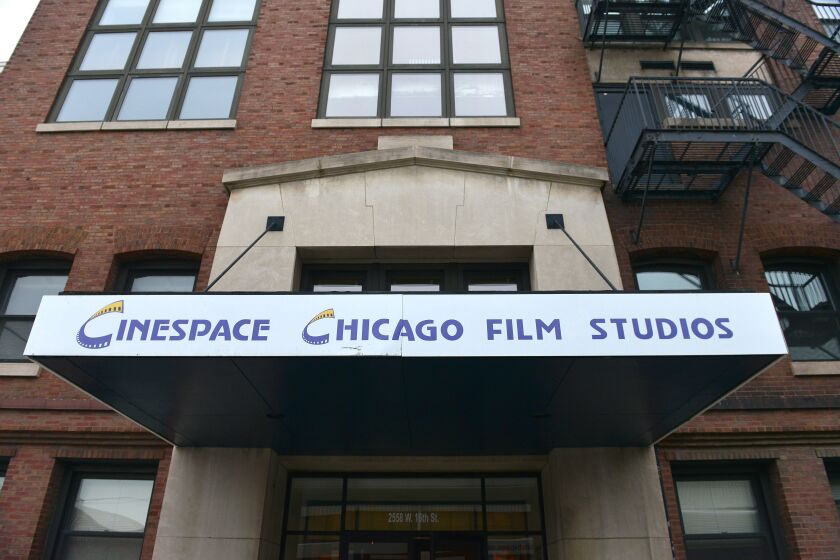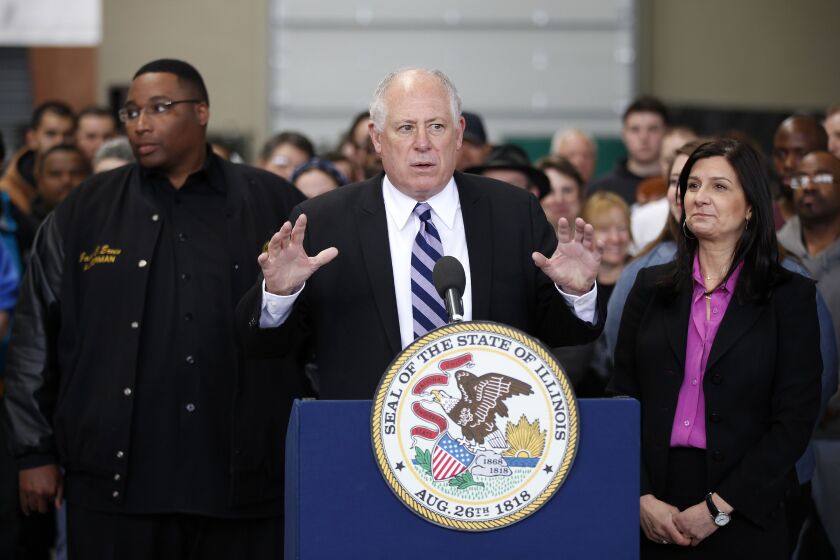When Mayor Rahm Emanuel kicked off his re-election campaign last month, he stood amid the backdrop of Cinespace Chicago Film Studios and boasted that the former steel mill where NBC’s “Chicago Fire” and “tons of TV shows and movies” are filmed is “bringing good jobs and opportunity to hundreds of Chicagoans.”
What Emanuel didn’t say: Alex Pissios, the studio’s president, owed City Hall $19,901 at the time of the mayor’s Dec. 6 campaign kickoff on a Cinespace stage emblazoned with Chicago flags.
Or that City Hall had been negotiating to give Cinespace a tax break in 2013 at the same time it was trying to collect $250,000 in city fines from Pissios a few months before he ascended to the top spot at the studio.
Pissios, 42, of Hawthorn Woods, reached a deal with City Hall in September 2013 to pay the city the $250,000 over several months.
But the northwest suburban man didn’t pay off the $19,901 debt until the beginning of January — weeks after the Chicago Sun-Times began asking city officials about 21 lawsuits Emanuel’s law department has filed against him over unpaid taxes and building-code violations.
During the time Emanuel’s administration was suing Pissios, the film studio he now heads was getting millions of dollars from state taxpayers.
Since March 1, 2011, former Gov. Pat Quinn gave the studio’s owners four state grants totaling $17.3 million to help buy and renovate properties on the former site of Ryerson Steel’s North Lawndale plant. Quinn committed another $10 million to the studio on Dec. 1, five days before Emanuel’s campaign kickoff.
Emanuel and Quinn adminisitration officials defended the decisions to support the studio, citing Cinespace as a major factor in the record $358 million in revenue the state’s film industry posted in 2013 — nearly double from the year before.
Neither Emanuel’s mayoral aides nor his campaign spokesman, Steve Mayberry, would say whether the mayor was aware of Pissios’ $19,901 debt to City Hall at the time he launched his re-election bid at Cinespace.
“The majority of Mr. Pissios’ debts accrued prior to this administration,” says Adam Collins, a mayoral spokesman. “Under this administration, the city has collected nearly $270,000 in debts, which have been accruing for years, from Mr. Pissios.”
A spokesman for Cinespace responded to questions with a written statement saying, “All claims owed to the city of Chicago by Mr. Pissios for private business matters occurring before he assumed ownership of Cinespace have been paid.”
Cinespace has had a meteoric rise since Toronto film studio owner Nick Mirkopoulos began building what the Chicago studio’s owners say is the largest movie and TV production studio east of Los Angeles. In 2009, Mirkopoulos pegged the project’s total cost at more than $80 million — which would mean the state grants would end up financing about a third of that.
After Mirkopoulos died in December 2013, Pissios — who is his nephew and was a real estate developer and studio executive under his uncle — took over as the studio’s president.
When Mirkopoulos set up shop in Chicago, he began banking with Belmont Bank & Trust, depositing millions of dollars in state grant funds there, state records show.
Belmont is a small, privately owned bank founded in 2006 by attorney James J. Banks, a 20-year member of the Illinois Tollway board whose late father, attorney Samuel V.P. Banks, also was on the Belmont Bank board. Other members of the board include former state Sen. James A. DeLeo, D-Chicago, and businessman Fred B. Barbara, a longtime friend of former Mayor Richard M. Daley.
The names of the four bank board members came up during the 2007 Operation Family Secrets trial of five Chicago mob bosses, though none of the four was charged. A former burglar testified he bribed cops by passing money through Sam Banks. A mobster’s widow testified James Banks and DeLeo ripped her off when she sold them a restaurant. And mob hit man Nick Calabrese testified that Barbara had participated in the bombing of an Elmwood Park restaurant in the early 1980s, though he was never charged.
Since March 2011, Belmont Bank has made nine loans to Cinespace for a total of about $24 million. Two loans totaling nearly $9 million remain outstanding; the others have been repaid, Cook County records show.
Karen Banks, the sister of James Banks and daughter of Sam Banks, works for Cinespace. Her cousin, Lisa Banks Ingargiola, a daughter of former Ald. William Banks (36th), is a $77,220-a-year executive for the Illinois Film Office, the state agency that oversees a tax-credit program credited with luring a growing number of TV and movie productions to Illinois. The program — whch Quinn extended in 2011 for 10 years — provides a 30 percent tax credit to films and TV shows for money spent on goods and services in Illinois. That includes wages paid to Illinois residents.
At the time Cinespace was getting started in 2010, Pissios was facing financial troubles resulting from failed development deals. When he filed for bankruptcy in January 2011, the city of Chicago was among the creditors he listed.
Since 2008, City Hall has filed 28 lawsuits against Pissios, Cinespace and other companies he’s affiliated with. Most recently, the city sued Pissios and the studio on Aug. 16, 2013, seeking $20,700 in real estate-transfer taxes on a piece of property Emanuel spokesman Collins says was unrelated to the studio.
On Sept. 9, 2013, Pissios signed a repayment agreement calling for him to immediately pay the city half the $250,000 debt and to pay the other half over the next five months. Collins says none of the debts involved Cinespace property. Still, the city threatened to revoke the studio’s business license if Pissios failed to make his payments on time, according to the four-page agreement.
Two days later, on Sept. 11, 2013, Emanuel announced the Cinespace tax break — estimated at $3.5 million over 12 years.
“TV and film production are important aspects of the Chicago economy,” the mayor said in a news release that day. “By lowering the cost of doing business, the tax incentive will make this facility more viable for this kind of work.”
The Chicago City Council approved the tax break on Oct. 16, 2013. But Cinespace hasn’t begun getting it because it hasn’t submitted all of the required documents, according to the Cook County assessor’s office.
Among those voting to approve the tax break was Ald. Jason Ervin (28th), who signed a five-year office lease with the studio in July 2012 with rent of $2,000 a month, according to county property-tax appeal records.
Since 2009, Pissios and the studio have made $22,250 in political contributions, including $2,000 to Ervin, state elections records show.
The producers of “Chicago Fire” paid $420,000 to lease space at the studio between Aug. 1, 2012, and Feb. 28, 2013, according to county records from a Cinespace property-tax appeal.
Another Cinespace tenant is Lagunitas Brewing Co., which recently gave $25,000 to Emanuel’s re-election campaign and $25,000 to Quinn’s failed re-election bid.
Before Quinn left office last week, officials with his administration said the state grants weren’t used to buy the property Cinespace leases to the brewery.
Emanuel, who faces four challengers in the Feb. 24 citywide election, himself became a Cinespace tenant last month, though for just a day, agreeing to pay Cinespace $1,500 to cover the stage rental for his campaign kickoff, according to campaign spokesman Mayberry.







